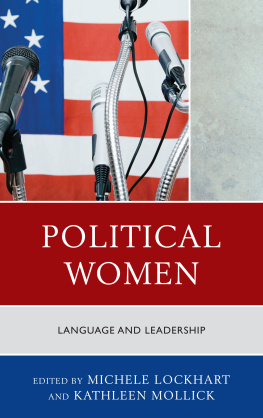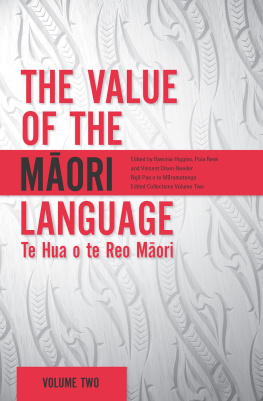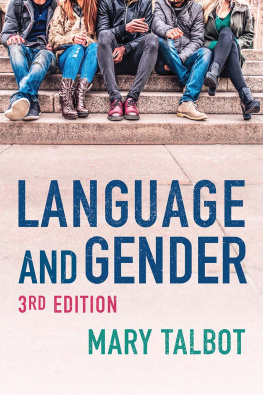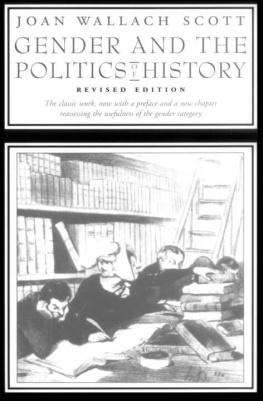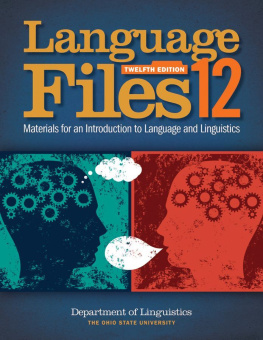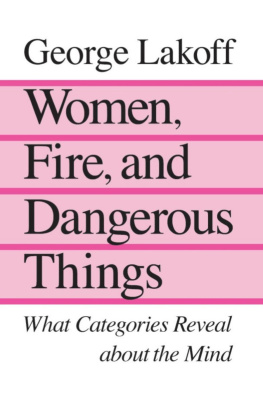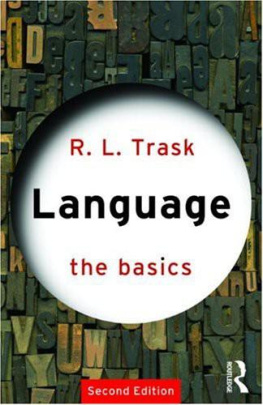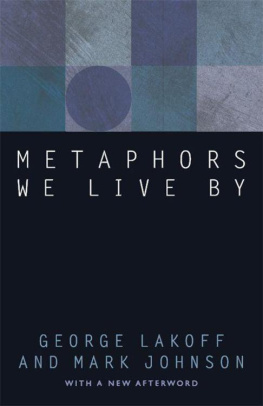LANGUAGE AND WOMANS PLACE
LANGUAGE AND WOMANS PLACE
Studies in Language and Gender
Mary Bucholtz, General Editor
ADVISORY BOARD
Penelope Eckert, Stanford University
Kira Hall, University of Colorado
Janet Holmes, Victoria University of Wellington, New Zealand
Miyako Inoue, Stanford University
Don Kulick, New York University
Sally McConnell-Ginet, Cornell University
Marcyliena Morgan, Harvard University
Deborah Tannen, Georgetown University
Ana Celia Zentella, University of California, San Diego
Reinventing Identities: The Gendered Self in Discourse
Edited by Mary Bucholtz, A. C. Liang, and Laurel A. Sutton
Pronoun Envy: Literary Uses of Linguistic Gender
by Anna Livia
Language and Womans Place: Text and Commentaries
Revised and Expanded Edition
by Robin Tolmach Lakoff
Edited by Mary Bucholtz
ROBIN TOLMACH LAKOFF
LANGUAGE AND WOMANS PLACE
TEXT AND COMMENTARIES
REVISED AND EXPANDED EDITION
EDITED BY MARY BUCHOLTZ


Oxford New York
Auckland Bangkok Buenos Aires Cape Town Chennai
Dar es Salaam Delhi Hong Kong Istanbul Karachi Kolkata
Kuala Lumpur Madrid Melbourne Mexico City Mumbai Nairobi
So Paulo Shanghai Taipei Tokyo Toronto
Copyright 2004 by Oxford University Press, Inc.
Published by Oxford University Press, Inc.
198 Madison Avenue, New York, New York 10016
www.oup.com
Oxford is a registered trademark of Oxford University Press
All rights reserved. No part of this publication may be reproduced,
stored in a retrieval system, or transmitted, in any form or by any means,
electronic, mechanical, photocopying, recording, or otherwise,
without the prior permission of Oxford University Press.
Library of Congress Cataloging-in-Publication Data
Lakoff, Robin Tolmach.
Language and womans place / Robin Tolmach Lakoff; edited by Mary Bucholtz.Rev. and expanded ed.
p. cm. (Studies in language and gender ; 3)
Originally published: New York: Harper & Row, 1975.
Includes bibliographical references and index.
ISBN 0-19-516757-0 (pbk.); ISBN 0-19-516758-9 (cloth)
1. WomenLanguage. 2. Sex role. 3. Sexism in language. 4. English languageSex differences. I. Bucholtz, Mary, 1966- II. Title. III. Series.
HQ1206.L36 2004
305.4dc22 2003056479
9 8 7 6 5 4 3 2 1
Printed in the United States of America
on acid-free paper
To my students, past and present,
who have been an inspiration for all my work. RTL
And for Barbara Bucholtz,
who refused to know her place. MB
The way we understood things twenty years ago
is not how we see them now; yet that understanding
was fruitful and led to todays deeper understanding.
Robin Tolmach Lakoff, Talking Power
Contents
Language and Womans Place
Annotations
MARY BUCHOLTZ
BONNIE MCELHINNY
SALLY MCCONNELL-GINET
ANNA LIVIA
JANET HOLMES
DEBORAH TANNEN
PENELOPE ECKERT
KIRA HALL
SACHIKO IDE
CATHERINE EVANS DAVIES
JENNY COOK-GUMPERZ
SHARI KENDALL
MIRIAM MEYERHOFF
SUSAN C. HERRING
SUSAN EHRLICH
SCOTT FABIUS KIESLING
JUDITH MATTSON BEAN AND BARBARA JOHNSTONE
YOSHIKO MATSUMOTO
MARCYLIENA MORGAN
NORMA MENDOZA-DENTON
SARA TRECHTER
WILLIAM L. LEAP
RUDOLF P. GAUDIO
ROBIN QUEEN
RUSTY BARRETT
Contributors
Rusty Barrett teaches in the Department of Linguistics at the University of Michigan, Ann Arbor. His research has examined the relationship between queer theory and sociolinguistic theory, popular conceptions of gay language, and expressions of identity in performances by African American drag queens.
Judith Mattson Bean is an associate professor of English at Texas Womans University. Her essays on twentieth-century sociolinguistics and discourse appear in Discourse Processes, Language and Society, SECOL Review, and Southwestern American Literature. She also has written articles and chapters on the discourse of nineteenth-century writer Margaret Fuller.
Mary Bucholtz is an assistant professor of linguistics at the University of California, Santa Barbara. She is coeditor of Gender Articulated: Language and the Socially Constructed Self (1995) and Reinventing Identities: The Gendered Self in Discourse (1999). Her research focuses on language, gender, race, and youth.
Jenny Cook-Gumperz is a professor of education at the University of California, Santa Barbara. A sociologist and sociolinguist, she is well known for her work on literacy theory and the social context of childrens language learning. She is the author of The Social Construction of Literacy, Social Control and Socialization, and Childrens Worlds and Childrens Language (with William Corsaro and Jurgen Streeck), as well as numerous articles on literacy and language socialization.
Catherine Evans Davies studied with Robin Tolmach Lakoff at the University of California, Berkeley. She is an associate professor in the English department at the University of Alabama. Her research explores gender issues, cross-cultural interaction, language socialization, humor, media and popular culture, and the discourse of the American South.
Penelope Eckert is a professor of linguistics at Stanford University. She is the author of Jocks and Burnouts: Social Categories and Identity in the High School (1989), Language Variation as Social Practice (2000), and Language and Gender (2003; with Sally McConnell-Ginet), as well as numerous articles on language, gender, sexuality, and adolescence.
Susan Ehrlich is a professor in the Department of Languages, Literatures, and Linguistics, York University. Her areas of research include language and gender, language and the law, and second language acquisition. Her work has appeared in journals such as Discourse & Society, Forensic Linguistics, and Language in Society. Her most recent book is Representing Rape: Language and Sexual Consent (2001).
Rudolf P. Gaudio teaches anthropology at Purchase College of the State University of New York. His research focuses on the moral and political economies of language, gender, sexuality, and space in northern Nigeria and the United States. His work has appeared in American Speech, Journal of Linguistic Anthropology, Socialist Review, and several edited volumes.
Kira Hall is an assistant professor in the Departments of Linguistics and Anthropology at the University of Colorado, Boulder. Her publications include the edited collections Gender Articulated (with Mary Bucholtz) and Queerly Phrased (with Anna Livia). She is currently completing a book on the linguistic and cultural practices of Hindi-speaking hijras in northern India.
Susan C. Herring, a leading expert on gender and computer-mediated communication, is a professor of information science and linguistics at Indiana University. She has edited three collections on computer-mediated communication and has written numerous articles on gender and the Internet. Her current research focuses on the representation of women and men in multimedia computer interfaces.
Next page

